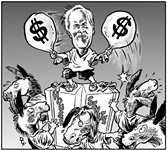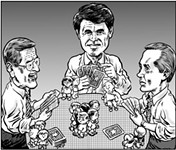Coming Up Lemons
HB 1 is all about tax cuts and gambling ... and did we mention public schools?
By Michael King, Fri., May 7, 2004
The second priority appears to be the care and feeding of the gambling lobby, as the grandly estimated $1.5 billion in "new money for education" will materialize only if the whole Lege agrees to open the state's horse tracks, dog tracks, and Indian casinos to 40,000 slot machines, making "racing" even more of an afterthought. Any dissent from that noble ambition, growled Appropriations Chair Talmadge Heflin, and there would just be less money left over for schools. Heflin also grumbled dyspeptically at the late amendment, offered by Dianne Delisi, to move $175 million from public school "performance incentives" back into the health care fund for teaching staff (granted and cut in half and promised again over the last two sessions). You realize, he asked Delisi, that this amendment "takes money from a fund to reward teachers who add academic achievement and gives it to teachers who just keep their jobs?" Heflin apparently considers health insurance a bonus for exemplary employees, although by that standard he and most of his colleagues should certainly not be enjoying excellent health coverage at state expense.
Craddick's deal had been struck, nonetheless, and Delisi's amendment was adopted without formal objection, perhaps in the understanding that at least a few pols and some teachers organizations would swallow hard and support the bill now before the House. As for the "nonprofessional" school employees omitted from the committee's sudden burst of generosity – they would be well advised to invest in Lotto tickets, or else start saving their spare change for the slots at Manor Downs.
Robin Hood – in Reverse
In truth, there was a lot of hard swallowing on the dais, as member after member introduced his or her vote, yea and nay, with variations on, "I'm not gonna like what I have to say." By the time you're reading this, the gargoyle of a bill will have been heavily bloodied on the House floor, where it will meet widespread (and bipartisan) opposition on virtually every major element. The most obvious resistance is to the expansion of gambling, which brings together religious conservatives and liberal school advocates – occasionally embodied in the same persons – who object either on moral grounds or pragmatic ones that gambling revenues have repeatedly proven both unreliable and diminishing.
Another complaint raised Saturday, mostly by Democrats but also by Round Rock Republican Mike Krusee ("I'll vote for it now to move the process along, but it will be a very difficult vote on the floor"), is that the new "payroll" tax, offered to replace the franchise tax, unfairly targets labor-intensive industries and indeed creates incentives to cut both wages and employees. Dallas Democrat Helen Giddings pointed out that two companies with identical gross payrolls could pay radically different taxes (currently set at $500 per employee) based on their number of employees, penalizing, for example, service industries and their mostly low-income workers. Border reps are additionally sensitive to the economic imbalance in the tax, which will favor capital-intensive industries long blessed in the state, like oil and gas and petrochemicals, against fledgling small businesses with many low-paid employees.
There were similar complaints about the increased and broadened sales taxes (booze, billboards, newspapers), which hit most regressively at the lowest-income taxpayers – numerous in Texas numbers but not easy to hear at the Lege. Dick Lavine of the Center for Public Policy Priorities described the revenue plan succinctly in the Houston Chronicle: "Mainly what this does is shift the responsibility for supporting our schools onto people who work for a living and the low- and moderate-income families who already pay the highest percentage of their income in sales tax. It's piling on the folks at the bottom in order to provide tax cuts for businesses and people who own property."
He didn't need to add that that's the way we do things in Texas.
Who's Counting?
It remains to be seen if the leadership can twist enough arms and cobble together enough votes to get some version of this grotesquerie past the whole Lege. Last spring, education votes were uniquely subject to rebellion by the Republican rank and file, and despite much hysteria to the contrary, nearly 90% of the schoolchildren and school districts in the state benefit from the current recapture ("Robin Hood") system. The leadership is apparently hoping that the promise of a whopping additional (temporary) 2% in education funds – even if the primary source of that funding is demon gambling – will overcome the reluctance of enough legislators to win the day.
But 76 votes (a bare House majority), nor a solid Republican 88, won't do it for the big ticket items, since they'll require proposing constitutional amendments. For gambling at least, and perhaps for the capped $1.05 property tax ("If it walks, quacks, and flies like a duck [a state property tax]," said Rep. Rene Oliveira, D-Brownsville, "it's not a chicken"), 100 votes will be needed, and at this point – absent last spring's tort-reform lobby muscle – it's very difficult to see where those 100 votes will come from.
On the other hand, Gov. Perry and the Republican leadership have been very effective at rhetorically transforming a public school funding crunch into a property tax crisis, so it may well be that they have a floor strategy that will persuade two-thirds of the House and Senate to vote in direct opposition to the best interests of a large majority of their constituents, not to mention the schoolchildren of Texas. Lord knows it would hardly be the first time. ![]()
Got something to say on the subject? Send a letter to the editor.









